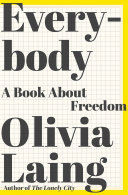
Everybody
A Book about Freedom
- اطلاعات
- نقد و بررسی
- دیدگاه کاربران
نقد و بررسی

April 15, 2021
Investigating the body and its consequences. Growing up in a lesbian household in the stridently homophobic Britain of the 1980s, novelist and cultural critic Laing, winner of the Windham-Campbell Prize, felt she was "not a girl at all, but something in between and as yet unnamed." The sharp dissonance "between how I experienced myself and how I was assumed to be," she writes, was like a "noose around my neck." Reflecting on her fraught sense of embodiment, Laing creates a penetrating examination of the political and cultural meanings ascribed to bodies as well as the relationships of bodies to power and freedom. The body, writes the author, was central to cultural protests--gay rights, feminism, and civil rights--that essentially were struggles "to be free of oppression based on the kind of body you inhabited." The controversial Austrian physician and psychoanalyst Wilhelm Reich serves as gadfly and guide as Laing thinks about the forces that shape and limit bodily freedom. In the early 1930s, Reich coined the term sexual revolution in order "to describe the universe of happiness and love that would arise once people had shaken off their shackles" of sexual repression, and he claimed to have discovered orgone, "the universal energy that animates all life." With Reich as a touchstone, Laing investigates many artists and writers with particularly vexed connections to their bodies: Susan Sontag in her ferocious response to cancer; radical feminist Andrea Dworkin; Agnes Martin, who, like Reich, "wanted to connect people to a kind of universal love" but became undermined by paranoia; Ana Mendieta, whose art violently depicted rape; Allen Ginsberg; Malcolm X; and Nina Simone, whose music enacted a "cathartic passage through fury, mourning, horror, hurt, despair, and out again to joy." Laing reveals in visceral detail society's terror "of different kinds of bodies mixing too freely" and envisions a future in which that terror no longer exists. Intellectually vigorous and emotionally stirring.
COPYRIGHT(2021) Kirkus Reviews, ALL RIGHTS RESERVED.

April 15, 2021
Intrepid cultural critic Laing (The Lonely City, 2016) conducts incisive inquiries into complex subjects by assembling a galaxy of innovators with whom to commune. Here she takes a tangible approach to freedom by focusing on how our bodies--from the color of our skin to gender, illness, and sexual orientation--determine our place in society. The central figure in the corresponding mandala of searchers is the brilliant, increasingly unmoored, and cruelly persecuted psychoanalyst Wilhelm Reich, "one of the strangest and most prescient thinkers of the twentieth century," whose foundational perception, "that our bodies carry an unacknowledged history," gave rise to body psychotherapy. Tracing Reich's influence leads Laing to many radicals, including writers Kathy Acker, Andrea Dworkin, and Susan Sontag; visual artists Agnes Martin, Ana Mendieta, and Philip Guston; and singer and songwriter Nina Simone. Laing's disclosure that she has "always felt like a boy inside" inspires an examination of gender fluidity, while her account of participating in England's environmental movement precipitates consideration of civil disobedience--putting one's body on the line--punctuated by a profile of gay civil rights leader Bayard Rustin. Laing's finely crafted blend of incisive memoir and biography vitalize this unique chronicle of the endless struggle "to be free of oppression based on the kind of body" one inhabits, a work of fresh and dynamic analysis and revelation.
COPYRIGHT(2021) Booklist, ALL RIGHTS RESERVED.




دیدگاه کاربران